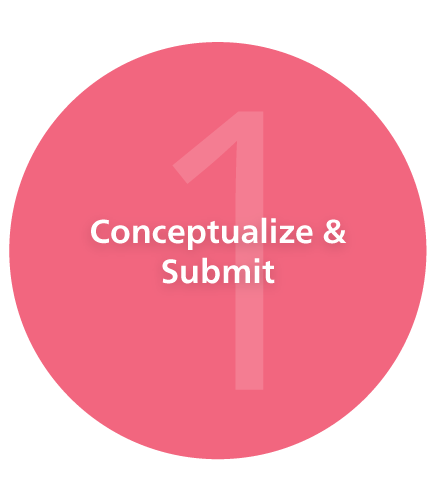Conceptualize & Submit

The concept of your research project decides the direction you will take and how you may implement your idea. At this stage, you should identify a potential funder, align your project proposal to their priorities, and get feedback on your proposal. Finish your conceptualization by submitting your proposal to a funder.
Develop idea
All research projects, whether theoretical or empirical in nature, should be meticulously structured to address a specific question, typically by scrutinizing a hypothesis or theoretical framework. Your research question may either originate from personal curiosity or be predetermined by your research team or a funder. The question or hypothesis should be pertinent to the potential funders of the research and endeavor to fill gaps in prior knowledge.
If you do not have a clear question in mind, conducting a literature search on a specific topic can reveal gaps in the existing body of knowledge (see also the Literature research tab). Additionally, exploring current funding calls can provide insights. These calls often target specific topics and thus may spark ideas for research. If you intend to respond to such a call, it is essential to form a research question that aligns with the call objectives. A search for current research grants can give valuable indications of who else is working on the topic and who has funded similar research (see also the Select funding tab).
Services and advice
Early-career researchers can obtain advice on how to develop a research idea from their supervisor, experienced colleagues, and their institute. Established researchers should evaluate whether there are grant opportunities that correspond to the project idea and whether the idea is sufficiently competitive.
The University Library of Bern UB offers discipline-specific information for researchers that can also help you at the start of a research project (pages in German).
- Human and Social Sciences (only in German)
- Medicine and pharmacy
- Natural sciences
- Law and Business Sciences (only in German)
- Theology and Humanities (only in German)
The Medical library also offers information on the Recherche page under the heading “research question and protocol”.
For evidence synthesis projects, experts from the University Library offer support from the formulation of the research question to the publication of results.
Tools and infrastructure
You can get inspiration for research ideas and potential funding by subscribing to research funding platforms and newsletters where calls are published.
Search for similarly funded projects on funders’ websites, or use a search platform such as Dimensions. Dimensions allows you to search for grants from the major funding agencies, including SNSF, and to find related publications, patents, clinical trials, and so on. For more features, you can create a free user account with your UniBE account. For more details, see the "Select funding" tab.
Considerations and directives
It is advisable to focus your research question on one or more individual hypotheses or problems, each of which can be tested or discussed. Ensure that the methodology you have planned supports you in answering the question.
Literature research
The literature research enables you to gain an overview of the current research landscape, detect gaps, and, for the natural sciences, identify areas where replication studies could offer valuable insights. You will also be able to gain an overview of existing data on which you can build your own data analysis. Using a tool to reference and annotate the literature you review will help you manage citations and bibliographies.
Services and advice
The University library provides support with literature searches.
If you are at a graduate school, check whether it offers courses on literature research. For instance, courses are offered by the Graduate School for Health Sciences (GHS), the Graduate School for Cellular and Biomedical Sciences (GCB), and the Graduate School of the Arts and Humanities (GSAH).
Tools and infrastructure
The University library offers several tools, including these:
You can...
- ... find an overview of their services here.
- ... find information on how to perform a literature search on the Systematic Searching page;
- ... perform a literature search on the Research platform;
- ... search the multi-disciplinary Databases;
- ... check information on University library subject-specific support on the Subject information page;
- ... get access to Reference Management Software here;
- ... order and borrow books and journals/journal articles;
- ... use 2900 study places across 20 library locations;
- ... use the BORIS Portal institutional repository of the UniBE for lists of scientific publications produced at the UniBE or research data and databases.
Watch out for scientific fraud

Before using an article as the basis for your work, check whether any scientific misconduct or errors have been discovered in the article. For example, on Retraction Watch or PubPeer.
Considerations and regulations
Tips for your literature search

- If you are searching a database, make sure to use appropriate terms. For example, PubMed returns significantly better results if you use MeSH terms.
- Be aware of the biases programmed into the algorithms of keyword search platforms. It is best to use a variety of platforms. You can get advice from the University library on this. There is also an online course on research skills (Recherchekompetenzen, in German only).
- Consult the literature periodically to ensure that all relevant new information is available to the research project.
To be able to use the University library services, you have to log in using a VPN connection if you are using wifi. To be able to borrow books at the University library you need your UNICARD to provide user ID.
Develop methodology
If you work with data, you must define the data collection and analysis methods you want to use in your research project in advance. If you do not work with data, the theoretical framework of your project will determine the appropriate methodology. The methods should be appropriate to answer your questions.
A Data Management Plan (DMP) forms the basis of good research data management. These plans define the type and source of research data you will be generating and using and outline how research data will be collected, organized, stored, and shared with other researchers or the public. You should adhere to best practices for data management and ensure compliance with any relevant data sharing policies or requirements. Depending on the research topic, some funding agencies may require that you develop a DMP. Depending on the funding agency, it may need to be submitted along with the grant application or up to 6 months after the project start. In some cases, a DMP must be submitted before funds are released. Please consult the resources on the Research data management tab for further information.
Services and advice
If you are an early-career researcher, contact your supervisor or experienced colleagues for help on defining your research methodology. Basic training on domain-specific methodologies is the responsibility of the faculties.
Courses, workshops, presentations on methods-related topics are most notably organised by:
- some graduate schools (GHS, GCB, GSAH),
- within the university-wide Transferable Skills Program for (Post)Docs, or
- at the UniBE coffee lectures offered at your institute's library (in German only).
For support on DMPs, please consult the Open Science Team of the University library. The Open Science Team also provides Templates for different discipline specific Data Management Plans.
In addition, you can find domain-specific support for research methods, analysis and open science with these units:
| Domain | Support and advice |
|---|---|
Health & Life Sciences |
|
Data Science |
|
Social Sciences & Humanities |
University library research support for:
|
Natural Sciences |
University library research support for natural sciences |
Research involving animals |
|
Considerations and regulations
Your research methodology can be developed by asking these questions:
- Will you need courses or other training before you can use the methods you have chosen?
- Do you need collaborators or team members to provide specific competences?
- Will you have access to the facilities you need?
- Is the method you used standard in your field or will it require justification?
- Do you need ethical or other permits for the methods you want to use?
- Are you allowed to use secondary data collected by someone else?
- For clinical research, you can pre-register your project to promote transparent and reproducible research. You can register your project at PreclinicalTrials.eu.
Are you planning research including animals? Please visit the UniBE Compliance and Good Research Practice page and consult this information:
- Swissuniversities' Policy for animal research
- "Weighing of interests for proposed animal experiments", a report
- "PREPARE: guidelines for planning animal research and testing", an article
- Swiss Transparency Agreement on Animal Research (STAAR)
- Culture of Care Charter.
Select funding
You need to find a funding scheme that fits the scale and subject of your project. You have to consider both the amount of financial support you need and whether the goals and specifications of the funding agency align with your project's topic, collaboration partners, and your (scientific) age, etc. After you have identified the potential funder and funding scheme, you may have to adapt your research idea and proposal to the funder's priorities and expectations .
Another approach is to choose the funding scheme first and only then develop an idea that fits its specifications. This is particularly advisable for career development grants.
Before you start drafting your application, verify the eligibility conditions. Make sure you understand what is required, and check any UniBE internal deadlines in case official letters of support or submission approval (e.g., for applications to US federal funders; uni intern) are required.
Services and advice
You can find a list of the most relevant public funding agencies and funding programs for UniBE researchers on the Funding Programs page.
The Academic Careers Office advises early-career researchers on academic career planning and offers support in finding suitable funding opportunities at postdoctoral level.
If you are an early career researcher, your first point of contact should always be your supervisor, experienced colleagues or your institute. If you need further advice about available funding schemes, your contact depends on the funding scheme to which you want to apply:
Funding schemes |
Contacts |
|---|---|
National and international public funding schemes |
|
National and international public funding schemes (Innosuisse, Eurostars, Eureka) |
|
UniBE Internal Grants (among others for the preparation of future applications) |
Various offices |
Grants for Early-Career Researchers |
|
Swiss 3R Competence Centre for animal research |
The following faculties and centers at UniBE also offer information, support, and even funds for specific purposes:
Faculty / Center |
Link |
|---|---|
| Faculty of Business, Economics and Social Sciences | Research career support measures (Fördermassnahmen; in German) |
| Faculty of Humanities |
Equal opportunities (funds for individual measures that help to promote equality of opportunity in university studies and research) |
Faculty of Human Sciences |
Individual consultation and project-specific support Promotion (habilitation funding programme as well as parents' fund) |
Faculty of Medicine |
Vademecum (Inselspital, Direktion Lehre und Forschung) (in German) Research Project Fund (Center for Artificial Intelligence in Medicine) |
| Oeschger Centre for Climate Change Research | |
Faculty of Science |
|
Faculty of Theology |
Scholarships (in German) Faculty fund to support post-docs (Fakultärer Fonds zur Unterstützung von PostDocs (in German)) |
Vetsuisse (veterinary science) |
Promotion of Early Career Researchers and Equal Opportunities |
Tools and infrastructure
Databases to find funding opportunities:
- You can use the SNSF's "search funding" interface for their funding opportunities.
- You can use the Pivot-RP search platform, a database of research funding opportunities covering all scholarly disciplines. The database can be used free of charge by all researchers at the University of Bern and the Inselspital. The Grants Office offers an introduction to the service.
- You can also use Fundraiso, a directory for finding foundations and funding agencies.
- research.swiss is an online database run by the State Secretariat for Education, Research and Innovation (SERI) of calls for proposals that are co-financed by the federal government.
Other search platforms can be found on the Funding Search page.
Considerations and regulations
You should know

- When choosing a funding scheme, carefully check the funder's rules and funding criteria to make sure you are eligible for funding. The Grants Office can advise you if needed.
- If your chosen funder is one that has not previously funded research at your institute, contact the Grants Office to check that the terms and conditions, including intellectual property, are acceptable to UniBE.
- Align your project with the format, structure, and priorities of the funding instrument (i.e. the grant).
- Be aware that you might have to provide a letter of support from your institute or UniBE.
- Depending on your project you might have to start applying for permits even before you secure your funding.
- Check the UniBE Directives (in German) concerning the contractual flow of research, development and service contracts and acceptance of research contributions.
- There are UniBE Regulations (in German) about accepting third party funding at UniBE that you should be aware of.
Ethics and compliance requirements
At this stage of your research, you should learn about the legal, university and funder's requirements on ethics and compliance. For some research projects, you might need to obtain compliance approvals before starting your research, so knowing what to expect is key even at this early stage. At the latest, prepare your requests for compliance approvals when you begin preparing your research project.
Compliance areas that commonly affect research include, but are not limited to, ethics, security and export controls, environmental health and safety concerns, and the use of human subjects or animals.
What to do?

- Read and confirm that your research meets all funder requirements concerning compliance. This may include approval of protocols, use of materials, data sharing and release agreements, and other requirements.
- Identify UniBE policies and procedures that apply to your research and the office or contact corresponding to the requirement.
Services and advice
The UniBE Research Compliance and Good Research Practice page provides information, regulations and contacts on topics that are important for conducting research at UniBE.
The Good Research Practice Contact Point can give individual advice on a variety of topics or direct you to more specialised advisory bodies.
Tools and infrastructure
Several courses help you learn about research compliance:
- If you want to learn more about research integrity, take UniBE's comprehensive subject-area-specific online course. The course can be terminated with a short test. Providing you pass the test, you will receive a certificate that suffices for some funders as proof of your knowledge of research integrity and good research practice.
- Several other courses or lectures on research integrity topics are available on the Transferable Skills Program for (Post)Docs.
- Courses are also available on IT security and data protection.
Considerations and regulations
Please find topic-specific regulations on the Research Compliance and Good Research Practice page.
Define partners and your team
When you select your collaborators and team, you need to consider two major aspects:
You must think about which expertise and support you need to complete your project successfully. You should ask yourself these questions:
- Can you handle all the methods you want to use, or will you have to employ someone to help?
- Is it possible to collaborate with someone who has access to facilities you need?
- Will you need an interdisciplinary or international collaboration?
- Do you need a support person for experiments, analyses, or administration?
You must also consider the constraints of the funding source, your budget, and your time.
- How much time can you devote to the project?
- Does the funder require a minimum time commitment from you?
- Will you have time enough to train an inexperienced person, or will you have to invest in the employment of an experienced person, who will require a higher salary?
- What resources are available for salaries?
- Are there restrictions on employing staff?
Services and advice
Your first point of contact on employment and salary topics is your institute. Most issues are covered in the internal Human Resources A-Z pages (German only). Your institute's HR manager can contact the Human Resources Department if you have questions that they cannot answer.
Tools and infrastructure
To find potential cooperation partners:
- use a platform such as Dimensions: see the Develop idea tab,
- search funders' websites: see the Select funding tab, or
- for EU projects: Euresearch - Find Partners for your Project.
If your research also involves cooperations with partners from industry, you might want to approach the Innovation Office for questions on potential cooperation or Unitectra for questions realating to tech transfer and intellectual property rights.
For salary costs, please see the Define budget tab.
Considerations and regulations
Be aware

Salaries will use most of your budget. It is important to check the scales for the costs of scientific assistant, postdoc, PhD student, and so forth at an early stage. See the Define budget tab for further information.
Identify facilities and resources
As you plan your research project, you should also identify space requirements and ensure you have access and the support/approval of the hosting department or organization. This planning can include securing specialized facilities and budgeting for specific equipment, supplies, tailored services, and specialized personnel. Your first contact is your institute or faculty. They will consult with the Facility Management Office if needed.
Space and facilities
Documenting the space needed for your research will include descriptions of the area required for the proposed activities. This may include laboratory space, clinical space, access to animal facilities, computer equipment for data collection and analysis, and office resources for the team and administration. If you are applying for externally funded research, reviewing funder requirements for space commitments is critical. Additionally, the use of space not allocated to the research team may require letters of assurance or of commitment.
Equipment
Identifying equipment needed to complete the aims of the project is another important step at this stage and another area in which reviewing funder requirements is essential. Use of equipment not allocated to the proposed research team may require letters of assurance. If equipment is to be purchased, such expenses need to be included in the proposal budget.
Services
Some types of research require contracted services; these may be services from the University or externally contracted services. Engagement with service providers may require coordination with both contractor and funder, as the use or dissemination of contracted services may have different cost structures or requirements depending on the source of research funding.
What to do?

- Review and confirm all funder requirements for identification and availability of facilities and resources prior to submitting the application.
- Specialized training or approvals may be required to use certain facilities and resources. Identify governmental and University policies, procedures, training, and access requirements. Keep this in mind when recruiting your team members (see the Recruit team tab).
- If your research requires the space or expertise of another researcher, be sure to have their support in writing to include in your proposal documentation. Funders may have specific requirements for documenting expertise and commitment.
- Consider specific safety, ethics, or facilities requirements for biomedical or other lab work, research with animals, and other risk-related activities.
Services and advice
UniBE has a range of Core Facilities that offer various services and infrastructure to researchers at UniBE and Inselspital.
The Security Office offers advice on topics such as work, health, and environmental safety. For general questions, please first contact the Safety Officer in your institute or faculty.
IT Services include hosting, server maintenance, server virtualisation, storage services, authentication infrastructure and groupware, installation and maintenance of administration software. Your first contact is your institute’s IT manager.
The Animal Welfare Office and the Experimental Animal Center offer advice on facilities and resources for animal research. Please contact them as early as possible if your research involves animals.
Considerations and regulations
Purchasing equipment or services with a value above CHF 50,000 requires internal UniBE approval, to comply with the regulations on public procurement. Your first contact should be the finance manager of your institute. Guidelines and forms are available on the page for expenditure approvals (Ausgabenbewilligung; German only).
Define timeline
To define your timeline, you must go through the list of everything you plan to do during your project. Think about the best sequence for the tasks, because some depend on each other, and start early on tasks that risk being delayed, such as those involving permits and ethical approvals.
Services and advice
If you use animals in your project, please contact the Animal Welfare Office as early as possible.
Considerations and regulations
Don't forget to...

... plan holidays and teaching periods, if applicable.
... plan some buffer time and start early on tasks that risk being delayed, especially if other tasks depend on them.
... register early for courses if you need training in methods or handling and keeping animals, for instance.
... plan the time needed for official procurement steps if purchasing large equipment is necessary.
... apply early for permits. You cannot start the research without the relevant authorization.
Define budget
Once you know which methods you want to use, which facilities you need, and who you want on your team, you can start working on your budget. You should list all items and costs that are necessary and reasonable to complete your project.
Services and advice
If you have questions about project budgeting, such as about salaries and employment of team members, you should first contact the Finance and HR manager at your institute. If needed, they can contact the Human Resources Office.
The Grants Office and Innovation Office provide information and support (Uni intern) on budgeting for certain funding instruments (grants) of the large public funders.
Tools and infrastructure
To estimate salary costs, start with the indications in the information sheet on wage ranges (Lohnbandbreiten Qualifikationsfunktionen, German only; uni intern) and add the employer’s costs for the social contributions (fixed at 15% for SNSF applications). The UniBE also has a tool for calculating salaries (German only). This tool can give you an idea of how much you will have to spend for various categories of employees. Your first contact for these calculations is the HR manager in your institute. The Grants Office and Innovation Office provide salary information for some funding schemes (see the Information and Tools pages; Uni intern).
The UniBE Core Facilities provide services and infrastructure. Potential collaboration with a Core Facility must be budgeted. For IT services, hardware and software, see the tariffs sheet (Tarifblatt, German only; Uni intern).
Considerations and regulations
Be aware!

- To save money on your budget, it is important to check which facilities are available at your institute and/or at UniBE. Can they be used for free, or do you have to pay a fee? Do you have to register in advance?
- If you have already chosen your collaboration partners, check if they can offer facilities you can use.
- Please check the specifications of your funding for restrictions on the use of your financial resources. Which categories are eligible expenses, and what is the maximum amount that is allowed? Can you include inflationary increases for salaries?
- A good practice, even if not required by all funding agencies, is to create and plan a timeline and categorize costs per year or phase of your project.
- Consider hidden costs such as taxes, overheads, maintenance, the inflation rate, and additional costs, such as for uploading data to research data repositories.
- If the funder allows you to request indirect costs, or overheads, you must include this in your budget.
Write and submit your project proposal
The exact form and content of the proposal depends on the requirements of the funding instrument. In general, it contains the information required to assess the scientific quality of the application including its feasibility and any other elements that are indicated in the evaluation criteria, in particular,
- the topic of your proposed research
- the aim, scope, and novelty of your research
- the context of your research
- the design and methodology
- the contribution that your research will make to scientific knowledge in your field
- the CV(s) of the Principal Investigator(s)
- the project organization (incl. roles of partner, charts)
- additional considerations depending on the type of grant (e.g. career development, impact considerations, business potential, etc.)
Services and advice
Several faculties offer services for preparing and writing grant proposals. Please consult your faculty to learn more.
For courses on writing a research proposal, please see the Transferable Skills Program for (Post)Docs page and the various graduate schools and doctoral programs.
The Grants Office offers feedback on certain types of proposals submitted to the SNSF, EU, and US federal funders. Contact the Innovation Office for feedback on Innosuisse proposals.
Contact the Animal Welfare Office for projects that involve animal research.
Considerations and regulations
Before you start writing your proposal, carefully read the instructions of the funding instrument. In addition, make sure you respect the general policies and guidelines of the funder and of UniBE. Note that some proposals can only be submitted by your superior, the institute director or UniBE (Vice-Rectorate for Research and Innovation).
Please check the deadlines for submitting the proposal early and allow enough time for writing and revising your budget. Ask your supervisor, colleagues, and the Grants Office (see above) to check your proposal and give you feedback. Do not submit at the last minute. Most funders have a strict deadline and will not take into account any last-minute problems you have with the submission platform. Always check the files you have submitted by downloading a complete copy of your application. Most funders will not allow you to replace incorrect files after the deadline.
Make sure that your CV is up to date.
Problem solving

During your project, you may need to solve various issues: related to your budget, your team, contractual issues, compliance issues, etc. For externally funded projects, some issues may need to be discussed directly with the third-party funder. If you are unsure, please contact the Grants Office. For all other projects, please contact the Research Management Office.


